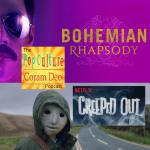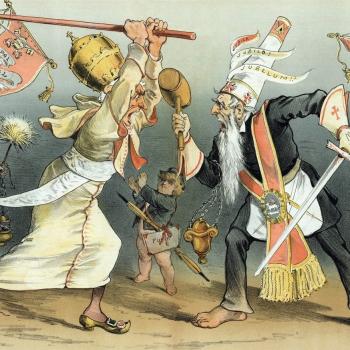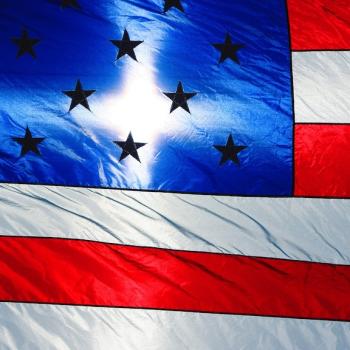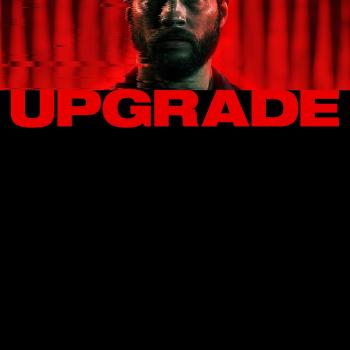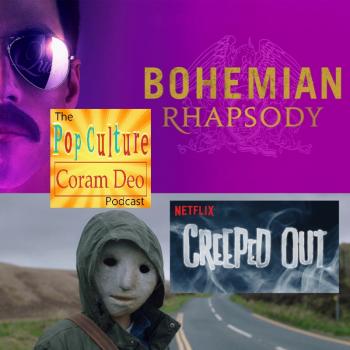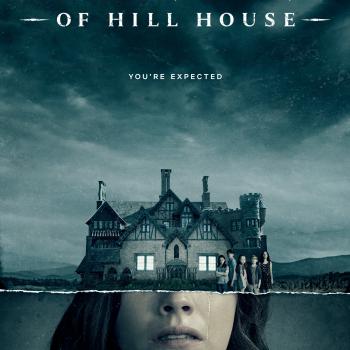What to Make of the Horror Genre
If you listen to or read the work we’re doing here on Pop Culture Coram Deo you already know that Jared and I are more than a little optimistic – certainly, it seems, compared to our fellow evangelicals – about the positive potential for edification present in the horror genre. Our episodes (and write-ups) on Get Out, IT, The Thing, The Exorcism of Emily Rose, The Haunting of Hill House and more are a testament to both our interest in that genre and the sense we get about how many people are consuming horror content.
That being noted, it was with great interest that I read the recent re-post of “The Holy, Horror, and Halloween” by Doug Wilson.[1] In the post (from 2012) Wilson is attempting an explanation of what we all sort of agree seems like a rapid cultural rise in the interest of horror movies, shows, books, and so forth. I recommend reading the post. What I am about to quote isn’t the only explanation Wilson proposes for the phenomena under consideration but it is the one I had never considered so I’m going to quote it here for further discussion:
So I want to begin by making a few observations about the attractiveness of death. It is a moth to the flame kind of attraction, that is true enough, but it is a strong and powerful attraction nonetheless. In Prov. 8:36, Wisdom (a great lady) is speaking, and she says, “All they that hate me love death.” So a fascination with the things of death is hatred of wisdom. Folly is attracted to death. Folly has a death wish, but what particular kind of folly are we talking about?
I want to argue that it is the folly of guilt, and in particular, sexual guilt. “The sting of death is sin; and the strength of sin is the law” (1 Cor. 15:56). The law is the strength of sin, and that sin is the sting of death. But the sting of death is an inexorable one. When Christians are commanded to deal with some of their fundamental issues, their members which are on the earth, note what the apostle tells them to mortify — “sexual immorality, impurity, passion, evil desire, and covetousness, which is idolatry” (Col. 3:5, ESV). When you don’t deal with this stuff scripturally, the result is that you feel like damaged goods, and that is coupled with the fact that the desires haven’t gone away, which leads to more misbehavior, which leads to more guilt. If the thing is compounded with the bloodshed of abortion, what you have is a society-wise reservoir of bloodguilt building up.
Horror is a feeble attempt at catharsis. A sinner, one who deserves to die, goes into a theater, and a couple hours later comes out of the theater again — alive. There has been judgment, there has been blood, there has been justice, after a fashion. The spectator has put his ten bucks down for the privilege of laying his hands on the goat before it is slaughtered up there on the screen. The same goes for some creeptastic haunted house event. You go there, get yourself whipped up as though you were going to die in that place, somebody else dies instead, and out you come again. Resurrection has never been so easy.
Again, just to note, this isn’t the only explanation offered in the piece. Wilson also proposes that Christians too often trot after the cultural whims of the moment (and who can argue that point?) which will explain, in part, why horror interest is also on the rise in Christian circles. Also proffered: simple thrill-seeking via the adrenaline jolt of a good jump-scare or paying off on a drawn out build of dread.
What Horror Offers (?)
I’m writing not so much to disagree. I’m still chewing on this atonement-by-proxy idea and think there may be some merit to the proposal.
More positively, I’m writing to offer a counter-explanation for the phenomenon and perhaps see if Wilson cares to respond further.
To begin, there is much in Wilson’s piece I agree with wholeheartedly. Specifically, Wilson’s cultural analysis about our mounting guilt. Also in the point about this mounting guilt playing into the apparent rise in interest in horror among Christians and their neighbors. Specifically:
I know that our culture has been in a mad pursuit of death and fruitlessness for a generation or more, we have slaughtered millions of children to hide our orgasms from God, we have celebrated our constitutional right to such ghoulish things, and we now have massive blood-soaked pathologies showing up in our popular entertainments. I am not asking for the Nobel Prize here — but I ask you. What kind of entertainments would a guilt-ridden people produce?
To make my point most, um, pointedly, we absolutely are a people awash in the moral ruin of bloodshed and, as sinful creatures inescapably made in the image of our good Creator, guilt has to be accounted for in any cultural analysis.
I would go a bit further though – our sanguinary flood is taking place alongside (and it isn’t clear to me which issue is the tail and which is the dog) a massive cultural project of casting away all moral trappings. This is either:
(1) A continuation of mankind’s historical attempt to overthrow or, failing that, ignore as best we’re able the Lordship of Jesus Christ over all things or
(2) A blood-guilty culture obsessed with having sex without responsibility or consequence trying to mollify its conscience by ethical rejiggering.
Both alternatives lead me to a similar conclusion though: the rise of interest in horror is happening because our neighbors see it as an acceptable back door into the moral universe they’ve been trying to cast off but don’t want to admit they miss.
One example: Andy Muschietti’s IT from 2017 became the highest grossing horror film of all time.[2] That film is an adaptation of Stephen King’s already enormously profitable novel by the same name. And Muschietti’s film adaptation isn’t the only time the novel has been successfully adapted for screen – Tim Currie’s performance in the 1990 miniseries is pretty much universally beloved within the horror fan community, as is the show itself. So why does this story continue to captivate not only new fans but new generations of fans.
Well, consider the morality of the story. The world of IT recognizes:
(1) That creatures who prosper by feeding on children are, rightly, to be considered monstrous (looking at you Cecile Richards, Leana Wen, and the rest of the trolls in your nest).
(2) It is a good thing for upright people, even at great risk to themselves, to oppose, fight, and end if possible this monstrous consumption of children.
(3) Bravery in the face of evil is a thing to be not only celebrated but enjoyed for its own sake.
Think about all the words in that short description that our cultural moment would say are meaningless terms: “upright people”, “bravery”, and – by implication – the concept of valuing children as children. Or, in addition, the goodness of a community centered on a morally-just endeavor.
Now, to own the contradictions, King’s It novel contains an extended scene that is not only morally disgusting but also should have resulted in considerable, negative, and public pushback on its author. I’m not attempting to give an unqualified moral endorsement of the material. What I am saying is, “Look at the big themes and elements then ask what cookies they put on the bottom shelf for the reader/watcher.” Doing so leaves me unsurprised, as someone who embraces the concept of the imago dei, that the big picture of It is so happily consumed by so many.
Brian Godowa said something very similar last year in an interview published on Desiring God:
Godawa: I think the success of It (and its predecessor, Stranger Things) lies in the universal archetype characters and their issues that most of us relate to: nerds, outcasts, rejects, fatty, skinny, “losers.” The kids are classic sympathetic heroes with strong moral growth, and we are hungry for such things since we are awash in an entertainment culture of anti-heroes and morally relative stories that ultimately do not satisfy someone who desires moral clarity.
Or consider this excerpt from an interview with Scott Derrickson from back in his pre-Doctor Strange days where he talks about the horror genre:
Scott Myers: There’s a quote of yours that’s related to this in another interview: “For anyone who takes cinema seriously, it’s important not to limit yourself to just optimistic or happy movies. You’ve got to be willing to let the art of cinema take you into some darker places and figure out a way to make full use of it.”
And I think you were talking about being a horror director when you said, “It’s not about putting something evil in the world. It’s about reckoning with evil. We don’t need any more evil in the world. We need a lot more reckoning with it.”
It sounds like you think there’s almost a pedagogical value in some respects for viewers watching horror movies. That they’re compelled to reckon with evil.
Scott Derrickson: Yeah, I think that’s the fundamental moral value of the genre. It’s the role that horror and gothic art has played through most of human history, especially throughout the religious world — these horrifying depictions of how evil corrupts and visceral demonstrations of the consequences of evil.
…
Essentially, I feel very strongly that horror cinema serves a necessary good in the world. My boys are 12 and 14, and I’m watching them get drawn deeper and deeper into horror as I did at their age. It makes so much sense to me, that with all the tempestuous feelings they have, all the fears and anxieties that they now wrestle with as their understanding and experience of the world expands, the outlet of reckoning with that through horror cinema is a truly beautiful thing.
Whenever we finish watching horror movies together, they are always so happy. [laughs] It’s as though something has been dealt with. Something has been released. And it’s as though they’ve been given a bit more strength to go out and face whatever dark and oppressive things they are facing in their lives.
That’s certainly what the genre did for me and continues to do for me. It started in my teens and continues to this day. It’s what the genre has always been for me — a way of reckoning with fear.
Derrickson gets a lot right there – and that is why I think his The Exorcism of Emily Rose gets a lot right too.[3] But go further – yes, the genre lets us reckon with fear. But it also lets us live in a moral world for an hour or two. Both the world of horror stories and our world hold in common the presence of monsters. However, our world is putting increasing pressure on us to call monsters heroes and heroes monsters. So horror lets us revisit the abandoned home we’re sick for but are too proud to admit we want to live in.
I’ll acknowledge that IT may be an easy example. Suffice it to say for the sake of time that I think I can provide a pretty broad swath of similar examples of other horror movies that do similar things. We want to be able to point at a monster and say, “Monster!” with righteous indignation. And we want to know how to do that with real moral clarity rooted in objective standards rather than whatever our current cultural consensus is. Horror movies, horror stories, let us do that.
So the question I would pose to Wilson, and to you as a reader, is this: Say we put together a pie chart documenting the various reasons for the rise of interest in horror I think thrill seeking should be a slice, so should drifting with the cultural current. I am inclined to think proxy atonement should as well. But what is the biggest slice going to be labeled? I am suggesting that the largest slice should read, “Moral Sehnsucht.”
I’m also saying this is a good thing for Christians, assuming proper content qualifications. It’s useful for Christians as Christians. Wilson ends his piece saying that the need for atonement-via-proxy is a call for gospel preachers. I would say (even trembling, considering the freighted connotations for this word in the evangelical world right now) that this need for a moral world calls for Kingdom[4] preaching, preaching that comprehends, begins with, is driven by and sustained by the proclamation of the gospel even as it pursues “teaching them to obey all things I have commanded you” within the life of a local church.
It’s useful for serving neighbors too – it’s a conversation starter and worldview bridge that can be used for kingdom ends that might allow the believer to steal past the watchful gargoyles your neighbor has installed to guard against such kingdom talk.
Horror as Fairy Story
Tolkien and Chesterton had high confidence in fairy stories. I wonder if the horror genre might not fit a similar niche in our day. I’m thinking of the well-know Chesterton quote about bogeys[5] (and, in the sense that I’m writing this in some ways to Doug Wilson, I feel here like I’m quoting the deep magic to a loyal Narnian):
Fairy tales, then, are not responsible for producing in children fear, or any of the shapes of fear; fairy tales do not give the child the idea of the evil or the ugly; that is in the child already, because it is in the world already. Fairy tales do not give the child his first idea of bogey.[6] What fairy tales give the child is his first clear idea of the possible defeat of bogey. The baby has known the dragon intimately ever since he had an imagination. What the fairy tale provides for him is a St. George to kill the dragon.
Could it be that the modern horror genre doesn’t give us just a world of wicked and vile things but it does give us a world where those things are more properly categorized? To ape Chesterton, can horror give us a world where dragons aren’t celebrated?
I think so.
Mr. Wilson – I would be honored by a response with your own thoughts on the usefulness (or lack thereof) of the horror genre. And reader, I would be honored by yours as well.
– – – – – – – – – – – – – – – – – – – – – – – – – – – – – – – – – – – – – – – – – – – – – – – – – – – – – – – – – – – – – – – – – – –
[1] If you aren’t familiar with Wilson let me sketch out an introduction: Wilson is a pastor, educator, author, and family man who lives up in the chimney of Idaho in a town named Moscow. I read Wilson regularly and, almost always, find what he has to say thought provoking and most of that always-thought-provoking is helpful. Yes, I differ from Wilson on some point (see Heading: Paedobaptism for instance) and we’ve even had some blog-based back-and-forth) but even when I object to some public position Wilson takes I do so as someone who can appreciate the consistent thoughtfulness I have found over the course of having followed Wilson’s work through, well, reading a considerable quantity of his books and posts, listening to a number of his lectures, etc.
[2] Although I believe that if The Exorcist’s proceeds are adjusted for inflation the older film eclipses the younger in terms of money made.
[3] Note: not everything, merely a lot.
[4] To the reader: I ask you to load this usage down with Social Justice freight; I’m thinking of robust Great Commission proclamation here.
[5] From the essay, “The Red Angel” in Tremendous Trifles.
[6] You may be thinking of fighter pilots and Top Gun here. Chesterton uses the word in its more original sense – “An evil or mischievous spirit; a hobgoblin.”


